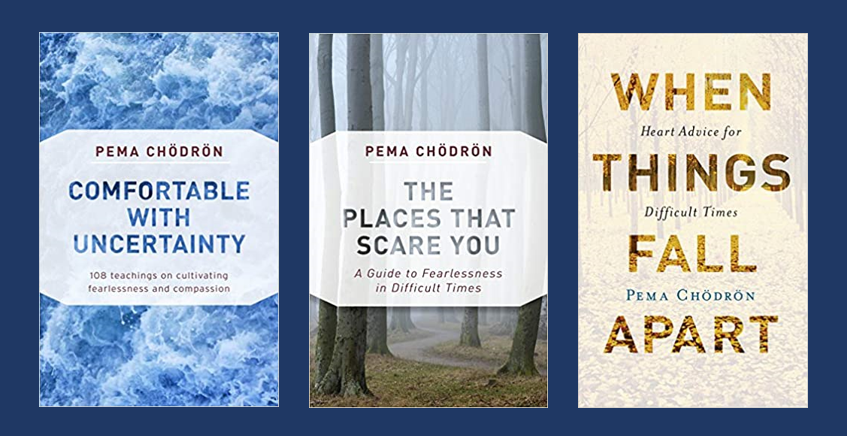Get Free Guides To Ascension & Global Consciousness
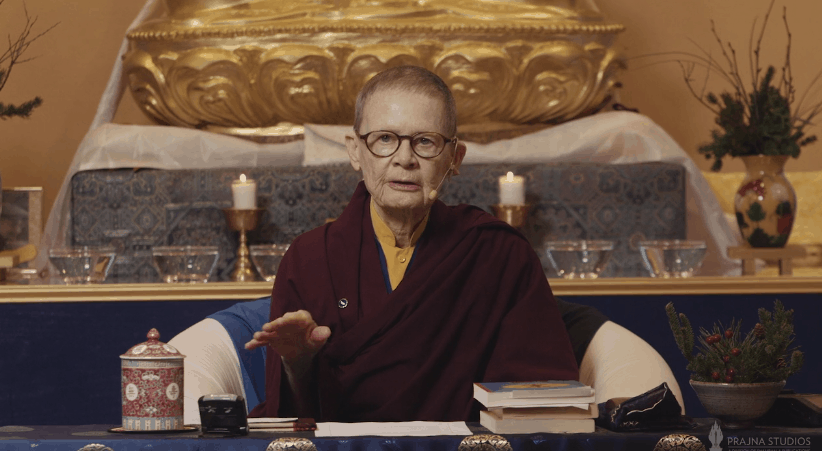
What if the source of your greatest pain was also the source of your greatest possibility? It’s a great question to contemplate after the tough year we have all had going through a pandemic. What has made Covid so unifying in so many ways is that it has affected the world together. In this time of going inward, we have an opportunity to truly see how interconnected we are rather than separate.
Many years ago when I was facing some deep challenges in my life and it seemed as if everything had been turned upside down and inside out, I discovered the work of Buddhist teacher Pema Chödrön.

Her book title: When Things Fall Apart, resonated with me at the time and I read it from start to finish and then for a second time. Since then, I have turned to sections of it during other challenging times in my life and since then of course, discovered many more of her incredible books. (see bottom of this article for a handful of my personal favorites).
Recently, I learned of an online retreat she is offering that kicks off in January 2021 and had the opportunity to review it early. It has a cool name as well: Turn Your World Around, and might I add, what great timing after the tough year behind us.
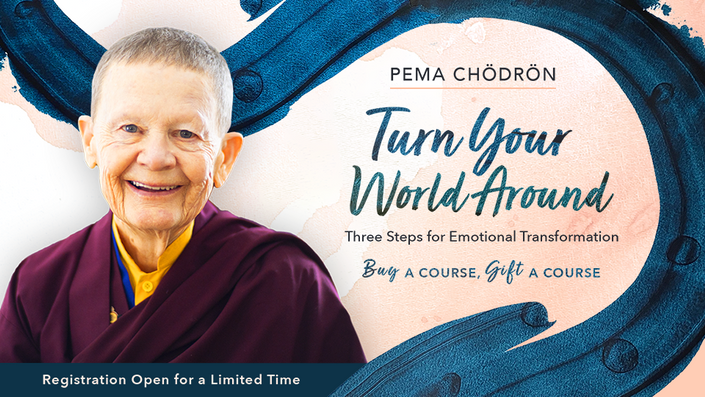
Turn Your World Around includes 11 hours of video teachings, all aimed at working with our challenging emotions, known in Buddhism as the kleshas. In this online retreat, Pema introduces the intense emotions at the heart of our suffering: craving, aggression, ignorance, pride, and jealousy. She offers students three powerful steps for working with them: refrain, reframe, and relax.
During the intense change and uncertainty we are all facing, her heartfelt advice helps us learn how to work with our chitter chatter minds and stay calm and relaxed as strong emotions come up.
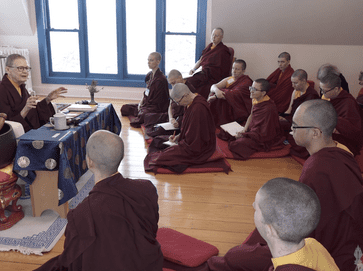
In this six-week interactive online retreat, Pema focuses on how to work effectively with your challenging emotions. All lessons are available and you may go through the course materials at your own pace. The facilitated discussion boards are open through May 30, 2021 and they also offer twice-weekly meditation sessions as well, which kick off on Monday, January 4, 2021.
There are six lessons in the course and each lesson is designed to last a week but again, you can work at your own pace since purchasing the online retreat gives you access so you can work around your own schedule.
What’s nice too is that you can download videos and course material as well and your access to the content is unlimited — yup, it doesn’t expire which is also a great feature.
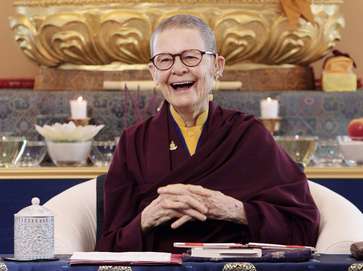
In addition to the content which you can download as PDF’s and the video teachings, there are live calls where you can ask questions directly to Pema — for the Q1 2021 online retreat, those calls will take place on Saturday, January 16 from 2 to 3 p.m. (EST) and Saturday, February 6 from 2 to 3 p.m. (EST). Recordings of the calls will be made available in the course for those who are unable to attend the calls or who would like to listen to them again.
One of the things that I loved about going through the course is tuning into her energy directly in a space she knows and resonates with most — her home monastery. Here, the recordings are done in the main shrine room at Gampo Abbey which adds to the intimacy of the learning.
It’s a unique opportunity to bring the dharma alive in your daily life with weekly practices, journal prompts, contemplations, and opportunities for discussion. In addition to the PDF transcripts mentioned earlier that you can download, you can do the same for video and audio files, which means you can tune in wherever you’d like, a wonderful feature, especially since my preference is to always be in nature as much as possible. Imagine sitting under a fig or apple tree while listening to the teachings of Pema Chödrön.
If you’re new to Buddhist teachings, the word kleshas will be new to you. Think of them as the intense and challenging emotions that we each encounter in our lives. She teaches you how to get some space from your habitual emotional reactivity using her go to’s: refrain, reframe, and relax.

The second lessons focuses on something referred to as shenpa, that experience of being hooked into the emotional rollercoaster ride. She asserts that unless we recognizing when we’re getting hooked, we can’t do anything about it. Shenpa is essentially noticing what hooks us.
Lesson three of the online retreat helps you take that mindful gap that you need so you can literally reframe what you see, experience and feel. In other words: what if the challenging and intense emotions we experience could become stepping-stones for creating compassion, loving-kindness, patience, and empathy? When we reframe, we can change our attitude and the meaning that we give to the emotion that comes up for us — so key!
Then you dive into relaxing into those intense emotions which come up. Pema teaches that when we try to fight our emotions, it is is like fighting a riptide—the harder we swim against it, the further we are pushed out to sea. The teaching suggests that rather than struggle against our emotions, we learn how to become one with them.
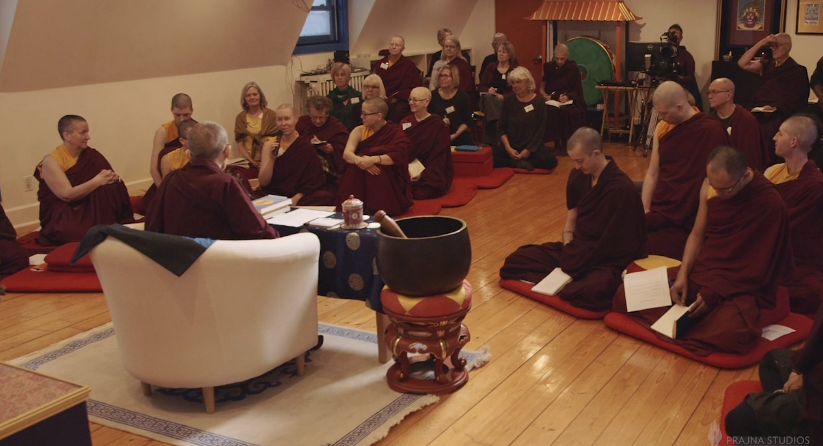
In the fifth lesson, Pema talks about how to work with whatever arises so that our emotions become the very path to our awakening. And of course, as we mentioned earlier, you have time to process these teachings in your own timeframe.
Pema first met her root teacher, Chögyam Trungpa Rinpoche, in 1972. Lama Chime encouraged her to work with Rinpoche, and it was with him that she ultimately made her most profound connection. At the request of the Sixteenth Karmapa, she received the full monastic ordination in the Tibetan lineage of Buddhism in 1981 in Hong Kong. Today, she is resident teacher at Gampo Abbey in Cape Breton, Nova Scotia, the first Tibetan Buddhist monastery for westerners in North America.
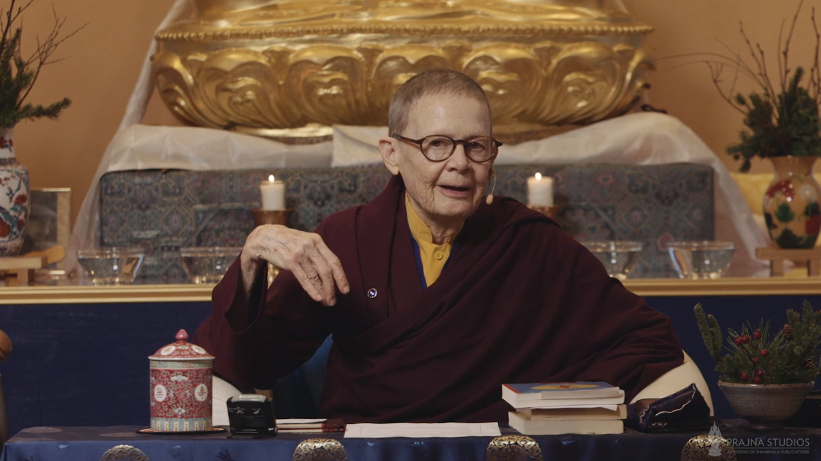
We love Pema’s guidance and although we started with her books, learning from her via video in this online retreat was a real gift — it’s so much more personal and allows you to dive much deeper into the teachings. Below are only a handful of her books, with Welcoming the Unwelcome (left below) being her latest release.
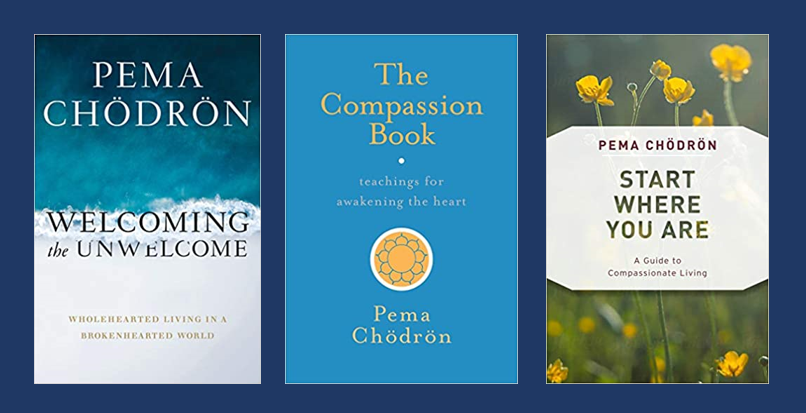
You can find out more about her books here, where you can also order directly from Amazon.
